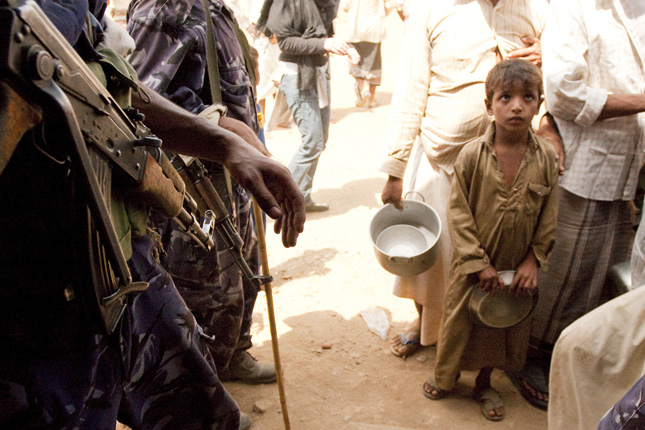-
On Streetlights and Stereotypes: Selection Bias in the Climate-Conflict Literature

Scholarly attention to the links between climate change and conflict has increased. But which places are analyzed most frequently by researchers, and what are the implications of their choices?
Let’s start with a joke: A policeman sees a drunken man crawling under a streetlight. He asks the man what he is doing there, and the man replies that he is searching for his wallet. The policeman doesn’t see a wallet, so he asks the drunk whether he is sure that he lost his wallet near the streetlight. The man replies: “No, I lost it in the park, but here is where the light is.”
Academics refer to this streetlight effect: when researchers select cases for reasons of convenience rather than for their scientific or practical relevance. In a recent study published in Nature Climate Change, we—together with colleagues from the University of Melbourne—found this streetlight effect at work in the literature on climate change and conflict.
We screened 124 peer-reviewed journal articles published between 1990 and 2017, analyzing the continents, regions, and countries they covered.
Countries with high levels of violence appear most frequently in climate-conflict studiesFormer British colonies—where the prevalence of the English language makes field research and data compilation much easier for many Western scholars—are more frequently represented in the literature than non-British colonies. In contrast, studies tend not to focus on those countries most highly exposed or most vulnerable to climate change. Of the 20 countries considered most at risk from climate change in 2015, not a single one was among the top 10 countries in the climate-conflict literature. The at-risk countries include several with large populations (e.g. Vietnam) and political instability (e.g. Yemen). Research on climate-conflict connections in these countries would be highly relevant, but it is apparently hindered by a language barrier, among other factors.
Second, countries with high levels of violence appear most frequently in climate-conflict studies. This might not seem surprising: If you are interested in conflict, you go where the violence is. However, if you only focus on violent cases, how can you learn anything about environmental conflict resolution and peaceful adaptation to climate change?
In addition, the overwhelming majority of these conflict cases are located in African, Middle Eastern and Asian countries. Asian and African countries are studied, respectively, three and four times as often as other countries. To be fair, large parts of those regions are quite vulnerable to climate change and have hosted (and still suffer from) a number of armed conflicts, but only focusing on those violent episodes tends to downplay important achievements in peace and development. Framing the climate-conflict literature around violence might help channel public attention towards important issues, but it also risks scaring away investors, promoting stereotypes, and spurring measures against potential “climate migrants” from southern countries.
To avoid these pitfalls, climate-conflict research will need to place a stronger emphasis on both successful adaptation and peaceful transformation in climate-vulnerable countries of the global south. Expanding the scope of research beyond English-speaking countries will certainly also help us understand and address present and future climate challenges.
Adrien Detges is a researcher and consultant at the Berlin-based think tank adelphi. He is also a researcher at the Freie Universität Berlin.
Tobias Ide is coordinator of the Peace and Conflict research field at the Georg Eckert Institute and was recently a visiting researcher at the University of Melbourne.
Sources: Annals of the Association of American Geographers, Global Environmental Change, Journal of International Development, Nature Climate Change; Political Geography
Photo Credit: Al-Mazraq, Yemen Oct. 9, 2009. A boy waits in line for food at the Mazraq refugee camp in Hajjah province. Courtesy of IRIN.
 A Publication of the Stimson Center.
A Publication of the Stimson Center.



